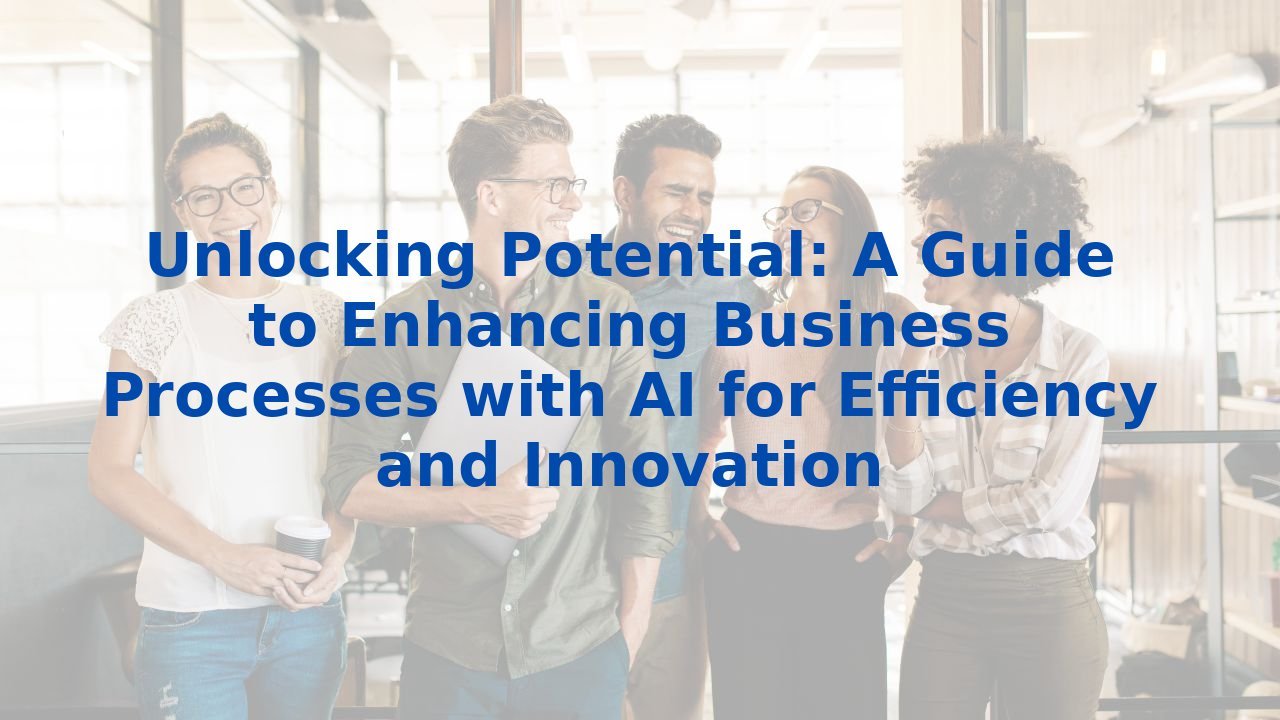Unlocking Potential: A Guide to Enhancing Business Processes with AI for Efficiency and Innovation
Unlocking Potential: A Guide to Enhancing Business Processes with AI for Efficiency and Innovation
Introduction
In an era where the competitive landscape is constantly shifting, businesses face the challenge of remaining efficient and innovative. Ideas abound; however, executing them successfully is where many organizations falter. This is where artificial intelligence (AI) steps in, providing the tools necessary to enhance various business processes, improve efficiency, and spur innovation. Let’s delve into how you can harness the power of AI to unlock your organization's full potential.
What is AI Process Optimization?
AI process optimization refers to leveraging AI and machine learning technologies to streamline business process management. This methodology emphasizes data analysis, automation of repetitive tasks, and empowering team members to make informed decisions. The ultimate objective? To reduce errors, increase productivity, and elevate operational efficiency.
Enhancing Business Processes with AI
1. Automating Routine Tasks
One of the most significant contributions of AI is its ability to automate mundane tasks. Intelligent document processing (IDP), for example, utilizes AI to convert documents into usable data without human oversight. This not only conserves time but also minimizes errors, allowing your team to channel their efforts toward more strategic initiatives.
2. Improving Decision Making
AI transcends traditional analytics by providing predictive recommendations that stem from intricate data patterns. Business analysts can conduct simulations to forecast how differing actions could affect profitability. Picture a loan officer leveraging AI to sift through data points, thereby ensuring funding is allocated to clients demonstrating sound financial habits. This leads to informed decisions that benefit both the organization and its customers.
3. Supporting Process Simulation and Analysis
With the power of AI, organizations can engage in effective process simulation by scrutinizing historical process data. Machine learning and deep learning algorithms discern patterns and dependencies within this data, allowing for the construction of a simulation model. This capability is pivotal for calculating key performance indicators (KPIs), identifying bottlenecks, and assessing the effects of proposed process alterations.
4. Real-Time Monitoring and Process Mining
Real-time monitoring is a game-changer in today’s fast-paced business environment. AI-driven process mining allows organizations to obtain real-time insights into process status, enabling timely intervention when issues arise. By detecting deviations, unexpected delays, or anomalies, AI can suggest optimization strategies that enhance workflow efficiency.
5. Enhancing Customer Service
AI is reshaping customer service by optimizing the customer experience. Chatbots tackle basic queries, while AI analyzes customer feedback to highlight areas needing improvement. For example, AI can parse incoming customer requests and seamlessly integrate essential details into ticketing systems, ensuring that human agents can handle more complex issues promptly.
6. Streamlining Sales and Marketing
AI analytics integrated into CRM solutions empower sales teams with actionable insights. Imagine predicting customer behavior to identify those most likely to make purchases or flagging at-risk clients. Chatbots play a crucial role in enhancing sales by providing real-time assistance, which ultimately minimizes frustration and reduces the risk of lost revenue.
7. Improving Product Development
Generative design is an example of AI's influence on product development. This AI-driven approach allows innovators to input design goals, enabling AI software to explore potential solutions. This not only saves time but also cuts costs associated with prototyping, allowing for more focused and impactful product development processes.
Benefits of Training Employees for AI
The true power of AI cannot be fully realized without knowledgeable personnel who can optimize its capabilities. An investment in employee training lays the groundwork for:
- Understanding AI-Driven Tools: Employees must grasp how AI tools operate and how they can be seamlessly integrated into organizational processes.
- Identifying AI Opportunities: Continuous education enables staff to spot where AI can be utilized for process improvement and innovation.
- Working with AI Systems: Effective interaction with AI systems is essential, ensuring that technology is leveraged to its fullest extent.
By fostering a workforce that is well-versed in AI capabilities, businesses can ensure they harness AI's potential for enhanced efficiency and innovation.
Conclusion
AI is not just a passing fad; it is revolutionizing business processes by automating routine tasks, refining decision-making, and elevating customer service experiences. As organizations integrate AI into their operations, they unlock avenues for greater efficiency and innovation. While AI serves as a potent tool, the real transformative power is realized when employees are trained to utilize it effectively. Together, these elements enable businesses to evolve, adapt, and thrive in the ever-changing marketplace, crafting a future defined by insight and achievement.



